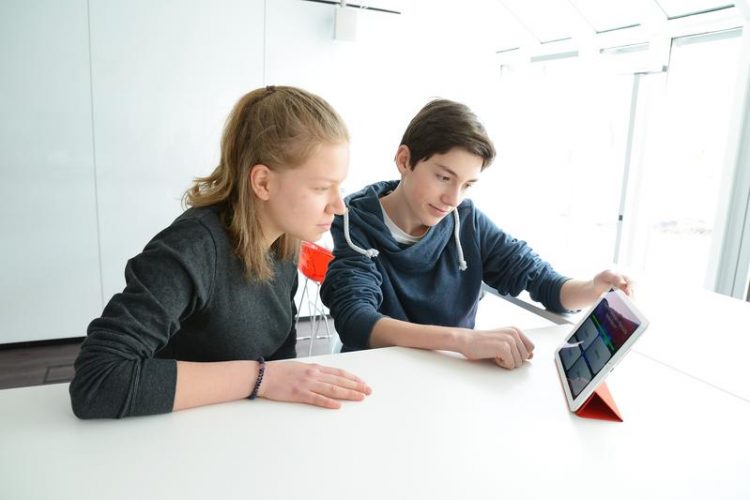How much sugar is in the soft drink?

PhotonLab, photonics quiz app Photo: Thorsten Naeser
A visit to the PhotonLab, and what students learn in its course, should ideally stick in their memories. But how can this be done effectively? The PhotonLab at the Max Planck Institute of Quantum Optics in Garching has now come up with one interesting way of doing so – the PhotonLab Quiz. This is an app that enables students to test themselves, extend their knowledge – and have lots of fun – long after their visit has ended.
The quiz focuses on what visitors have learnt in the PhotonLab, and the questions are graded according to their level of difficulty. The challenge is to come up with the right answers as quickly as possible in order to collect as many points as one can.
The app tallies the total points scored by each participant and generates a ranking table. So each contestant can take the quiz repeatedly or one can pit one’s wits against others. The quiz is available in German and in English.
One of the questions relates to the amount of sugar in a Coke and refers to an experiment involving the refraction of light that the students have done in the PhotonLab. In addition, students are asked about topics that were dealt with in the introductory lecture that they heard at during their visit, and are asked to name the parts needed to build a laser, for example.
The APP can be downloaded free from app stores for Android and IOS devices: PhotonLab Quiz
The student laboratory PhotonLab
The PhotonLab is a student lab designed to familiarize young people with scientific concepts, primarily in the fields of physics and photonics. It was developed as part of the Excellence Cluster MAP (Munich-Centre for Advanced Photonics) at LMU Munich, and is located at the Max Planck Institute of Quantum Optics in Garching near Munich. Each year the PhotonLab welcomes some 2000 students, who carry out a selection of experiments following a brief introduction to laser technologies and the properties of light. The experiments cover a wide range of optical phenomena, vary in the demands they make on students, and as far as possible are related to everyday situations and settings. A visit to PhotonLab is an ideal way to infuse students with enthusiasm for physics.
Contact:
Dr. Silke Stähler-Schöpf
Max Planck Institute of Quantum Optics
Hans-Kopfermann-Str. 1
85748 Garching, Germany
Phone: +49 (0)89 32 905 – 197
E-mail: staehler-schoepf@physik.uni-muenchen.de
Media Contact
More Information:
http://www.mpq.mpg.de/All latest news from the category: Physics and Astronomy
This area deals with the fundamental laws and building blocks of nature and how they interact, the properties and the behavior of matter, and research into space and time and their structures.
innovations-report provides in-depth reports and articles on subjects such as astrophysics, laser technologies, nuclear, quantum, particle and solid-state physics, nanotechnologies, planetary research and findings (Mars, Venus) and developments related to the Hubble Telescope.
Newest articles

A universal framework for spatial biology
SpatialData is a freely accessible tool to unify and integrate data from different omics technologies accounting for spatial information, which can provide holistic insights into health and disease. Biological processes…

How complex biological processes arise
A $20 million grant from the U.S. National Science Foundation (NSF) will support the establishment and operation of the National Synthesis Center for Emergence in the Molecular and Cellular Sciences (NCEMS) at…

Airborne single-photon lidar system achieves high-resolution 3D imaging
Compact, low-power system opens doors for photon-efficient drone and satellite-based environmental monitoring and mapping. Researchers have developed a compact and lightweight single-photon airborne lidar system that can acquire high-resolution 3D…





















